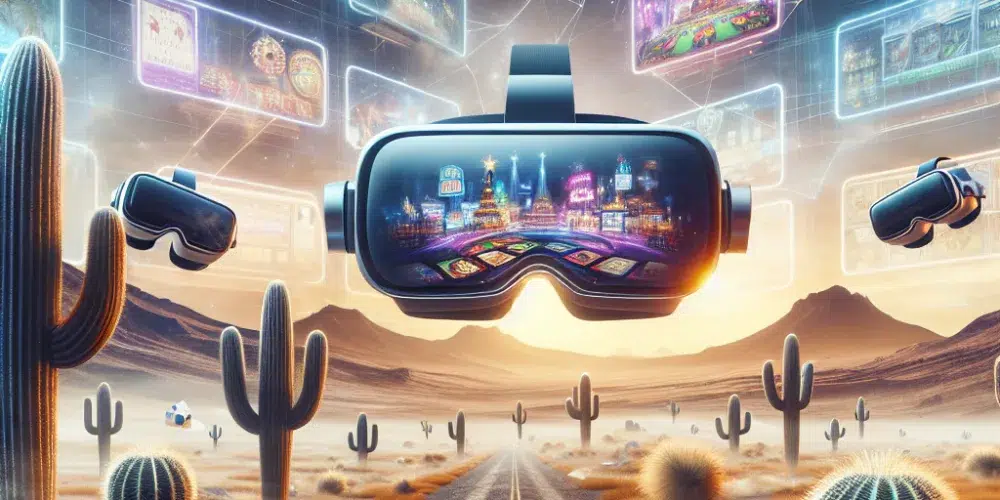Nevada Gaming Commission Authorizes VR Casino Platforms
In a groundbreaking decision on January 12, 2025, the Nevada Gaming Commission approved the establishment of virtual reality (VR) casinos, setting a revolutionary precedent in the online gaming industry. This initiative permits licensed operators to offer fully immersive gambling experiences through VR technology, targeting a new demographic of tech-savvy players while revitalizing the state’s gaming revenue.
Implementation and Technology
The approved VR casinos will allow users to engage in typical casino games such as slots, blackjack, and roulette in a virtual environment that mimics the feel of a physical casino. Using VR headsets, players will be able to interact with the game and other players in real-time, providing an experience that bridges the gap between online and physical gaming arenas.
Regulatory Framework and Safety Measures
The Nevada Gaming Commission has outlined a strict regulatory framework to ensure the integrity and safety of the VR gambling experience. Operators must comply with stringent data protection and cybersecurity measures to protect user information and prevent fraud. Additionally, the framework addresses concerns related to gambling addiction by mandating tools for self-limitation and reality checks within the VR environment.
Market Impact and Industry Reactions
This development is expected to significantly impact both the local and global gambling markets. Analysts predict that the introduction of VR casinos will attract a younger demographic and engage users who prefer digital gaming experiences over traditional ones.
Expert Opinions on Economic Effects
Industry experts suggest that the VR gambling sector could potentially elevate Nevada’s position as a global gaming hub. “With VR technology, Nevada is not just competing on a national level but globally,” said James Carlton, a gaming industry analyst. “This opens up enormous possibilities for growth and innovation in the digital gaming market.”
Casino Operators’ Plans and Expectations
Several Las Vegas-based casino operators have already expressed interest in adopting VR technology. Plans are underway to launch the first VR platforms by mid-2025, with extensive testing phases to ensure a seamless user experience. Casino executives posit that VR gambling will not only boost revenues but also provide an enriching user experience that could redefine the future of gambling.
Consumer Responses and Future Projections
Initial reactions from potential users have been overwhelmingly positive, with many expressing excitement about the novel gaming format. “The idea of playing in a Vegas-style casino from the comfort of my home is thrilling,” stated Emily Thompson, an avid online gamer.
Long-term Industry Outlook
As VR technology continues to evolve, its integration into the gambling sector is expected to expand, with predictions of similar regulatory acceptance in other jurisdictions. This could lead to a transformative shift in how gambling content is created, distributed, and consumed on a global scale.
Key Takeaways
– The Nevada Gaming Commission’s approval of VR casinos marks a significant innovation in the gambling industry.
– Strict regulatory measures have been set to ensure user safety and data protection.
– The industry anticipates significant economic growth and a wider, more diverse audience reach.
FAQs
What games will be available in VR casinos?
Initially, VR casinos will offer classic games like slots, blackjack, and roulette, with plans to expand the offerings based on user feedback and technological advancements.
How will VR casinos ensure gambling addiction is addressed?
Operators are required to integrate responsible gambling features, including self-exclusion mechanisms and on-screen reminders for users about the duration of their gaming sessions.
When are the VR casinos expected to launch?
The first set of VR casinos is expected to be operational by mid-2025, following a series of pilot tests and adjustments based on user experience feedback.

David Garato is a luminary in gaming journalism, renowned for peeling back the curtain on the gaming world with his witty and insightful commentary. A decade into weaving stories from the pixelated edges of indie games to the expansive universes of AAA titles, David’s work is a thrilling blend of analysis and adventure. When not writing, he’s live-streaming, sharing his gaming exploits with an engaged and growing audience. David doesn’t just write about games; he lives them, making him a trusted guide in the gaming community.
















